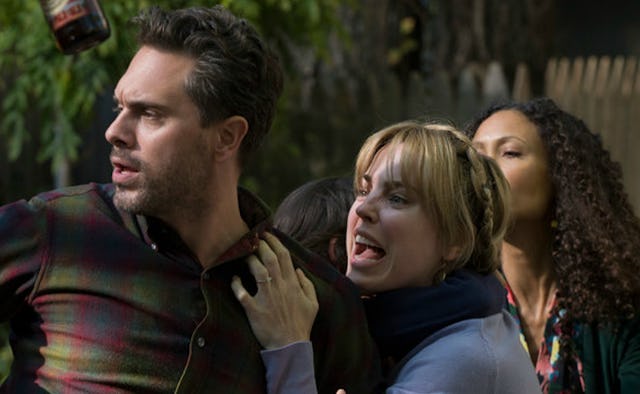'The Slap': Someone Was Bound to Get Popped

Oh, the misery of the middle-aged, the disappointments of the bourgeoisie. That’s the story of The Slap, which premiered last Thursday on NBC, a drama about the existential malaise of people who by all accounts should be happy and yet somehow aren’t.
Hector (Peter Sarsgaard), a city bureaucrat who’s just lost a big promotion, wakes on the day of his 40th birthday, longing for sex and Miles Davis and cigarettes and Valium—you had me at sex and cigarettes—and girding for that festive battle called a birthday party. Hector’s overbearing Greek parents arrive, along with his wealthy, boorish cousin, his artist friend who imbibes too freely and baits the cousin, and his wife Aisha’s friends and their boyfriends and husbands, all with assorted troubles of their own.
And it is a battle. The party is a bombardment of barbs, zingers, needles, and resentments, everyone only barely managing to keep their cool. Hector is struggling to squash his attraction to the babysitter, Connie; to keep his mother from upstaging his wife as hostess; to prevent an ill-behaved child, Hugo, from destroying his beloved vinyl collection. One is left with the impression of a man tending too many pots that threaten to boil over simultaneously. (Frankly, with the exception of Hugo, the kids are better behaved than the adults.)
There are a couple of tropes here we’ve seen before: the overbearing ethnic mother, for one. The distracted, strained, or bitchy wife, whose husband entertains fantasies of seducing a much younger woman (American Beauty, The Squid and The Whale), for another. (The I’m-helplessly-attracted-to-the-babysitter seems to be a kind of literary shorthand for men raging against the dying of the light.) In The Slap, Hector fantasizes that Connie is the only one who really “gets” him: They exchange Jane Jacobs and Chris Ware books; he introduces her to jazz on the car stereo. Describing Miles Davis to Connie, Hector says, “It’s so slow you think it’s going to stop, but it doesn’t.”
While the adults are longing, and squabbling, the kids are playing: They organize a baseball game in the backyard; they negotiate sharing the iPad.
That is indeed the longing expressed throughout the first episode: the longing to stop time, to again experience the suspended moment of lying tangled in the sheets with a new lover. A moment you fear, in middle-aged marriage, you’ll never have again.
While the adults are longing, and squabbling, the kids are playing: They organize a baseball game in the backyard; they negotiate sharing the iPad. They try to explain what “you’re out” means to Hugo, the ill-tempered 4-year-old, while drunken parents insult one another and peer at who’s secretly fondling whom. Hugo’s behavior finally becomes too egregious for the adults to ignore, and when his inebriated dad can’t get it together to control him, another father loses his temper.
When the slap comes, it’s as inevitable as a gun firing in a Chekhov play—all these desperate people who want what they want but can’t get it, thrashing against their restraints. The transgression of hitting a child opens the floodgates: The backyard becomes a ring of screaming parents, circling like boxers. For the first time all emotions on display are raw and sincere.
As with other narratives set among the upper classes in New York, it’s easy for the viewer to get distracted by what’s there: They have a nice house! They’re successful! They’re all so good-looking! (In fact, the character I felt most sympathetic with was an elderly patient in Aisha’s medical practice, arguing her bill with the receptionist.) But even in abundance, it’s the loneliness of a strained marriage, of parenting, of our own failures, that loom large. Like Miles Davis said, it’s what’s not there that demands our attention.
This article was originally published on